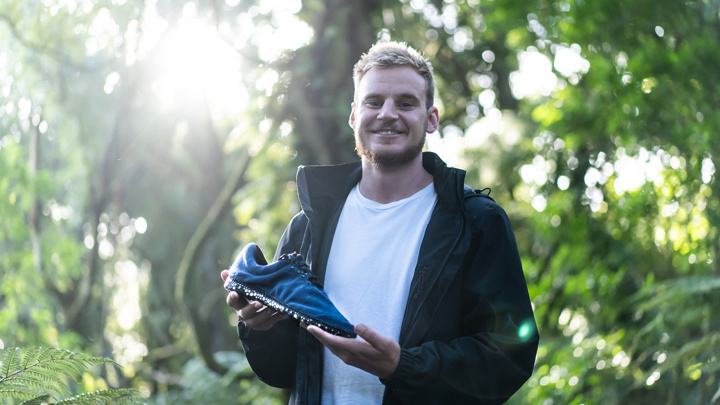- Since 1950, the amount of footwear globally has increased from seven billion (one per person) to 23 billion (three per person), with little to no consideration for end of life management being taken.
- Most shoes will end up in landfill with the average pair taking more than 50 years to fully decompose, leading footwear alone to represent 1.4% of global climate impacts.
- Voronoi Runners offer fully biodegradable footwear, finding a solution to the large amounts of waste from the global footwear industry.
This year’s national winner of the James Dyson Award, Voronoi Runners, addresses the global issue of waste from the footwear industry. The Voronoi Runner, designed by Massey University student Rik Olthuis, is a shoe that can be easily deconstructed, with every component and material able to be composted at the end of its life.
Runners up in this year’s competition also included Massey University students, Lisa Newman with her design SWITCH, a portable hand tool to help maintain clean cattle tails, and Samantha Hughes, with her design Clean Catch, a paediatric urine sample collection device.
Waste from the global footwear industry is increasing tenfold, however the industry has been slow to create better alternatives. Largely inspired by other alterative environmentally friendly footwear, Rik explains that even sustainable footwear using recycled or biodegradable materials still involve the use of strong adhesives, joining plastics and polyurethane foam.
Rik says: “Currently, footwear materials focus on performance, which is important, especially in runners. However, what isn’t being considered is what happens to the product once it’s no longer of use. The use of adhesives prevents the separation and treatment of materials at the end of the product’s lifecycle. I was inspired to design a sneaker using only biodegradable materials with no adhesives - leading the future of sustainable footwear.”
This year, the three New Zealand judges included Founder & CEO of the Sustainable Business Network, Rachel Brown ONZM, Dr Michelle Dickinson and Engineer Sina Cotter Tait. The trio reviewed over 20 entries submitted from university students and graduates (within four years) across the country, a record year for the number of New Zealand entries received, before selecting the Australian Winner and two Runners Up.
The Invention
Rik developed a gelatine and glycerine-based recipe for biodegradable foam to replace the more traditional blown polyurethane. Natural ingredients were added to improve the strength, compression, and water resistance needed to make it suitable for footwear. Rik then created a Voronoi structure; a 3D printed, strong and flexible biodegradable filament used to create a skeleton for the sole and midsole of the shoe. The upper was cut from a Merino wool fabric with 3D printed details, printed heel and toe caps that are inserted with a plant fibre reinforcement and sewn shut before stitching onto the edge of the sole.
Rik says: “Entering the James Dyson Award is a great way to have your ideas and designs evaluated and brought in front of critical eyes, helping with the transition from idea to realistic opportunity. Taking student work and presenting it in a professional light is a difficult step and James Dyson helps bring a sense of support and community in New Zealand’s product design market.”
Rachel Brown ONZM says: “As a mother of a sport fanatic son, this product really appealed to me. We go through shoes every four months so the idea of footwear that can break apart and can be composted is fantastic. The fashion industry is hugely wasteful and has a long way to go in terms of its approach to sustainability.”
Dr Michelle Dickinson adds: “I really like the approach Rik has taken with his design and the idea to use gelatin in the foam recipe is great. I think there is a huge market here for this product, something Allbirds has already proven.”
The James Dyson Award National Runners Up
Clean Catch, Samantha Hughes, Massey University, Wellington
Problem: Pre-potty trained children and their parents are being left traumatised from catheterisation due to the lack of a non-invasive way to collect a sterile urine sample from children under two in a reliable, consistent and convenient manner.
Solution: Clean Catch allows a child in need of a urine sample to be placed on the seat and safely strapped in, while a sterile collection cup is placed in the cup mount and adjusted to the appropriate position for the child so that when the child urinates the cup can collect a 'flying stream sample' while shielded from any contaminating factors.
SWITCH, Lisa Newman, Massey University, Wellington
Problem: Many dairy farmers are still relying on old, bulky, time-consuming products to help trim the tails of cows for milking. Current solutions are not maximised for the health and wellbeing of the cows and the farmers.
Solution: SWITCH is a tailor-design tool of circular clipper heads that hug the shape of the tail creating an easy, stress-free trim. Trimming helps maintain udder health and cleanliness, while still allowing the cow to have full use of her tail. The clipper blades are designed to mimic the shape of the tail, trimming more surface area than traditional flat clipper blades for a quick and efficient trim. The outer blade oscillates over the stationary blade reducing the risk of causing injury to the tail or yourself while trimming. SWITCH is also ergonomically designed to help reduce the risk of RSI found commonly among the aging farming population.
As national winner of the James Dyson Award, Rik will receive AU$3,500 to go towards his project, helping to test the strength and form of a biodegradable filament. All three finalists will move on to the international stage where a Top 20 will be selected by a panel of Dyson Engineers. The International Winner and Sustainability Winner will be handpicked by Sir James Dyson, with the International Winner receiving AU$55,000 and AU$9,500 for their university, and the Sustainability Winner receiving AU$55,000, and announced on 19th November 2020.



Share this page on